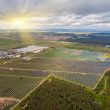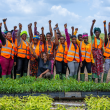Luxury group Kering has launched a Water-Positive Strategy as the next step in its science-based sustainability efforts, aiming to mitigate water-related risks across its global value chain. The strategy adopts a holistic approach that recognises the interlinked nature of climate change, biodiversity loss, and water scarcity, forming what the company describes as a “Climate-Nature-Water nexus.”
The initiative focuses on regenerating ecosystems, enhancing resilience, and fostering local collaboration in regions where Kering’s operations have the most significant water impact. The Group has identified 10 priority water basins, which will serve as focal points for action based on its science-based freshwater targets. Kering plans to work with local stakeholders to improve the quality, quantity, and accessibility of water in these areas.
Three core programmes will support the rollout of the strategy:
- Water-positive raw materials: Kering will prioritise sourcing materials that reduce pressure on natural resources, including recycled fabrics and regenerative agriculture outputs that cut pollution and help replenish watersheds.
- Water-positive stewardship programme: The Group will promote water efficiency and quality improvements within its operations and supply chain, introducing low-impact technologies such as chrome-free tanning and engaging suppliers in shared water stewardship practices.
- Water resilience labs: By 2035, Kering aims to establish dedicated labs in each of its 10 priority basins to deliver localised water-positive outcomes. The first lab will launch in autumn 2025 in Italy’s Arno Basin—a region critical to Kering’s leather supply chain. The labs will encourage multi-stakeholder collaboration, including with local authorities, other industries, and indigenous communities, to restore and protect freshwater ecosystems.
Marie-Claire Daveu, Kering’s Chief Sustainability and Institutional Affairs Officer, emphasised the urgency of evolving corporate water commitments: “The need for responsible corporate water stewardship to stay within planetary boundaries has never been more urgent. It is crucial that water commitments evolve from a reductions-only approach to become water-positive, regenerating and replenishing water and ecosystems associated with all business activities.”
Kering’s strategy aims to not only support ecological restoration but also strengthen the social and economic resilience of supply chain communities, helping secure long-term access to clean water amid mounting environmental pressures.













